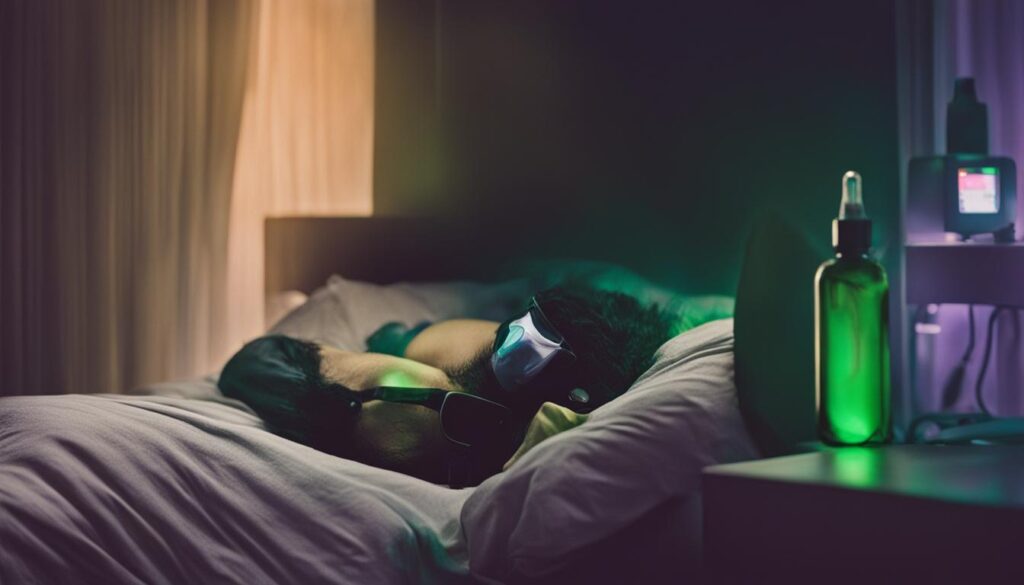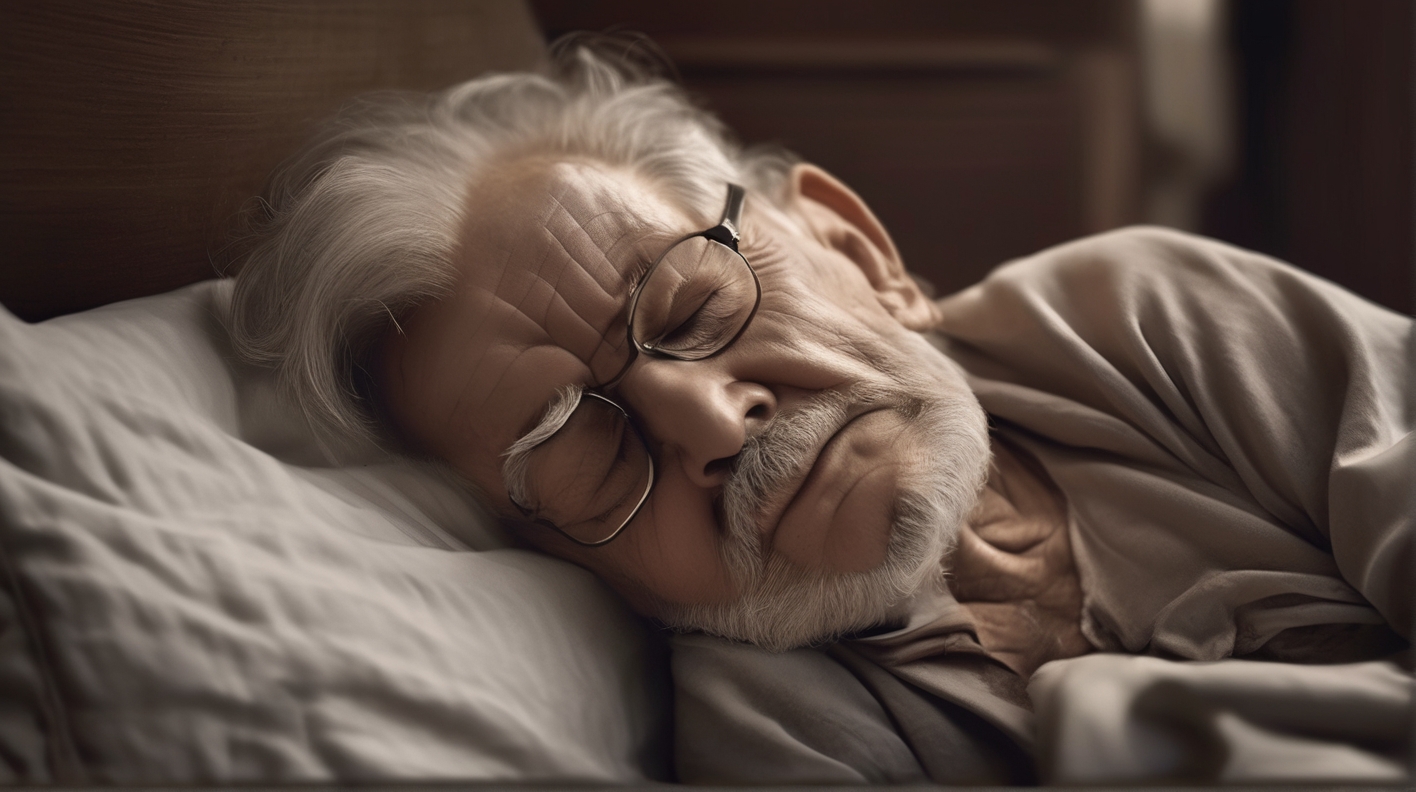Unveiling Truth: Investigating the Effects of CBD on Sleep Apnea
Welcome to our comprehensive investigation into the effects of CBD on sleep apnea. At , we are dedicated to uncovering the potential benefits and exploring the scientific evidence surrounding CBD as a treatment option for sleep apnea. Join us on this journey as we delve into the role of CBD in sleep regulation, examine the current research, and discuss the future of CBD in sleep apnea treatment.
Key Takeaways:
- Investigating the Effects of CBD on Sleep Apnea
- CBD benefits for sleep apnea
- CBD and sleep apnea research
- More research is needed to determine the efficacy and safety of CBD for sleep apnea
- Consult with a healthcare provider before considering CBD as a treatment option for sleep apnea
Sleep Apnea: A Common Sleep Disorder
Sleep apnea is a prevalent sleep disorder that affects millions of individuals worldwide. It is characterized by recurring pauses in breathing during sleep, leading to fragmented sleep and excessive daytime sleepiness. Sleep apnea can have a significant impact on a person's quality of life and overall health.
There are two main types of sleep apnea: obstructive sleep apnea (OSA) and central sleep apnea (CSA). OSA is the more common form and occurs when the airway becomes blocked or collapses during sleep. CSA, on the other hand, is less common and is caused by a failure of the brain to signal the muscles to breathe.
Table:
| Type of Sleep Apnea | Characteristics |
|---|---|
| Obstructive Sleep Apnea (OSA) | Airway blockage or collapse during sleep |
| Central Sleep Apnea (CSA) | Failure of the brain to signal the muscles to breathe |
Untreated sleep apnea can have severe consequences, including an increased risk of high blood pressure, heart disease, stroke, and diabetes. It can also lead to difficulties in concentration, memory problems, and mood disturbances. Therefore, effective treatment for sleep apnea is essential for improving overall health and well-being.
The Role of CBD in Sleep Regulation
CBD, or cannabidiol, has been a topic of interest in the field of sleep research due to its potential role in sleep regulation. CBD is a compound found in cannabis that does not produce a psychoactive effect, unlike THC. It interacts with the endocannabinoid system in the body, which plays a crucial role in regulating various physiological processes, including sleep.
Studies have shown that CBD may have a calming effect on the central nervous system, which could potentially regulate sleep patterns. It has been suggested that CBD might help alleviate symptoms associated with sleep apnea, such as anxiety and inflammation. However, it is important to note that there is limited research specifically on CBD and sleep apnea, and more studies are needed to establish its efficacy in treating this particular sleep disorder.
One study published in 2019 investigated the effects of CBD on anxiety and sleep in a clinical population. The researchers found that CBD improved sleep scores in a majority of the participants and reduced their anxiety levels. Although this study did not specifically focus on sleep apnea, it provides some insight into the potential benefits of CBD for sleep-related issues.
“CBD improved sleep scores in a majority of the participants and reduced their anxiety levels.”
Further research is necessary to determine the optimal dosage, delivery method, and long-term effects of CBD for sleep apnea. Clinical trials and controlled studies involving participants with sleep apnea are crucial for gaining a better understanding of how CBD can be used as a treatment option. It is important to consult with a healthcare provider before starting any new treatment, including CBD, to ensure it is safe and appropriate for your individual needs.
Potential Benefits of CBD for Sleep Apnea
While more research is needed, CBD has the potential to offer several benefits for individuals with sleep apnea:
- Improved sleep quality: CBD may help promote a more restful sleep by calming the central nervous system.
- Reduced anxiety: CBD has been shown to have anxiolytic properties, which can be beneficial for individuals with sleep apnea who often experience high levels of anxiety or stress.
- Inflammation reduction: CBD has anti-inflammatory properties that may help alleviate inflammation associated with sleep apnea.
However, it is essential to note that CBD should not be viewed as a replacement for standard treatments such as continuous positive airway pressure (CPAP) therapy. It may be used as a complementary therapy alongside conventional treatments, but medical supervision is crucial to ensure proper management of sleep apnea and to address individual needs.
The Scientific Evidence on CBD and Sleep Apnea
Although research specifically on CBD and sleep apnea is limited, studies have investigated the effects of CBD on sleep in general. These studies have shown promising results in terms of improving sleep quality, reducing anxiety, and promoting relaxation. However, it is important to note that more research is needed to specifically explore the effects of CBD on sleep apnea.
One study published in the Journal of Clinical Psychology found that CBD improved sleep quality in individuals with insomnia. The participants reported fewer sleep disturbances and a decrease in anxiety after taking CBD. Another study published in the Journal of Psychopharmacology showed that CBD reduced anxiety in patients with social anxiety disorder, which could potentially benefit individuals with sleep apnea who often experience anxiety-related sleep disturbances.
“CBD has the potential to address the underlying causes of sleep apnea, such as inflammation and anxiety, which can contribute to sleep disruptions. However, further research is needed to fully understand how CBD affects sleep apnea and to determine the optimal dosage and delivery methods.”
While the existing research is promising, it is important to approach CBD as a potential complementary therapy for sleep apnea rather than a standalone treatment. It is recommended that individuals with sleep apnea consult with their healthcare provider before incorporating CBD into their treatment plan. Additionally, it is crucial to purchase CBD products from reputable sources and follow the recommended dosage guidelines to ensure safety and effectiveness.
Table: Summary of CBD and Sleep Studies
| Study | Participants | Results |
|---|---|---|
| Journal of Clinical Psychology | Individuals with insomnia | Improved sleep quality, fewer sleep disturbances, decreased anxiety |
| Journal of Psychopharmacology | Patients with social anxiety disorder | Reduced anxiety |
In conclusion, while there is a growing body of evidence suggesting the potential benefits of CBD for sleep apnea, more research is needed to establish its efficacy and safety in this specific population. CBD may hold promise in addressing the underlying causes of sleep apnea, such as inflammation and anxiety, but further studies are necessary to determine the optimal dosage, delivery methods, and long-term effects. It is important for individuals with sleep apnea to consult with their healthcare provider before incorporating CBD into their treatment plan.
Potential Mechanisms of Action
Understanding the mechanisms by which CBD may affect sleep apnea is crucial in exploring its potential as a treatment option. While the exact mechanisms are not fully understood, research suggests that CBD interacts with neurotransmitters and receptors in the brain involved in sleep regulation. One possible mechanism is CBD's impact on serotonin levels, a neurotransmitter known to play a role in sleep patterns.
A study conducted on animal models found that CBD increased serotonin levels in the brain, leading to increased sleep duration and improved sleep quality. This suggests that CBD may have a direct influence on sleep regulation and could potentially benefit individuals with sleep apnea. However, further research is needed to confirm these findings and explore other mechanisms of action.
“CBD's interaction with neurotransmitters and receptors in the brain may contribute to its potential effects on sleep apnea.”
Another proposed mechanism for CBD's potential effectiveness in sleep apnea is its anti-inflammatory properties. Inflammation in the airways can contribute to the development and progression of sleep apnea. CBD has been shown to have anti-inflammatory effects and may help reduce airway inflammation, thereby improving breathing during sleep.
It is important to note that these potential mechanisms of action are still being studied and require further exploration. Continued research in this field will contribute to a better understanding of how CBD can potentially alleviate sleep apnea symptoms and improve sleep quality for individuals affected by this sleep disorder.
| Potential Mechanisms of Action | Effects |
|---|---|
| Influence on serotonin levels | Possibly regulates sleep patterns |
| Anti-inflammatory properties | May reduce airway inflammation |

CBD for Sleep Apnea Treatment
While there is currently no approved CBD-based medication specifically for sleep apnea, some individuals with this sleep disorder have reported using CBD as a complementary therapy alongside their existing treatment. It is important to note that CBD is not a replacement for standard treatments such as continuous positive airway pressure (CPAP) therapy or surgery, but it may offer additional benefits when used in conjunction with these treatments.
Consulting with a healthcare provider is crucial for individuals with sleep apnea who are considering CBD as a treatment option. It is important to discuss the potential benefits and risks of CBD, as well as any potential interactions with other medications. Additionally, healthcare providers can provide guidance on appropriate dosages and help monitor the effects of CBD on sleep apnea symptoms.
While anecdotal reports suggest that CBD may have a positive impact on sleep apnea symptoms, it is essential to remember that individual responses to CBD can vary. The effects of CBD on sleep apnea may depend on factors such as the severity of the condition, the underlying causes of sleep apnea, and the specific CBD product and dosage used. Medical supervision and regular follow-up are necessary to ensure the best possible outcomes.
Potential Benefits of CBD for Sleep Apnea
- Reduced anxiety: CBD has been shown to have calming effects on the central nervous system, which may help alleviate anxiety that can exacerbate sleep apnea symptoms.
- Inflammation reduction: Some studies suggest that CBD has anti-inflammatory properties, which could potentially help reduce inflammation in the airways and improve breathing during sleep.
- Promotion of relaxation: CBD may promote relaxation and induce a sense of calm, potentially helping individuals with sleep apnea achieve a more restful sleep.
“CBD has shown promise in alleviating anxiety and inflammation, which are common symptoms associated with sleep apnea.” – Sleep Apnea Research Study
Table: Summary of CBD and Sleep Apnea Treatment
| Benefits | Considerations |
|---|---|
| May reduce anxiety | Consult healthcare provider before use |
| Has potential anti-inflammatory effects | Individual responses may vary |
| Promotes relaxation | Use as a complementary therapy, not a replacement |
Safety and Potential Side Effects
When considering the use of CBD for sleep apnea, it is crucial to understand the safety profile and potential side effects associated with its use. While CBD is generally considered safe and well-tolerated, it is important to note that individual experiences may vary. It is always recommended to consult with a healthcare provider before incorporating CBD into your treatment plan.
Common side effects of CBD may include fatigue, dry mouth, and changes in appetite. These side effects are generally mild and temporary, but it is important to be aware of them. Additionally, CBD can interact with certain medications, so it is essential to discuss any potential interactions with your healthcare provider.
When purchasing CBD products, it is crucial to choose reputable sources that provide third-party lab testing to ensure quality and safety. This helps to ensure that you are using a product that is free from contaminants and accurately labeled in terms of CBD content.
Key Takeaways:
- CBD is generally considered safe and well-tolerated but can have potential side effects.
- Common side effects of CBD may include fatigue, dry mouth, and changes in appetite.
- It is important to discuss the use of CBD with a healthcare provider and be aware of potential interactions with medications.
- Purchasing CBD products from reputable sources that provide third-party lab testing is essential.
By understanding the safety considerations and potential side effects of CBD, individuals can make informed decisions about its use as a complementary therapy for sleep apnea.
The Importance of Research
When it comes to exploring the effects of CBD on sleep apnea, research plays a vital role in providing accurate and scientific insights. While there is growing interest in the potential benefits of CBD for sleep apnea, it is essential to remember that more studies are needed to establish its efficacy and safety in this specific population.
Currently, there is limited research specifically focused on CBD and sleep apnea. However, numerous studies have investigated the effects of CBD on sleep in general, showcasing promising results. Some studies suggest that CBD may improve sleep quality, reduce anxiety, and promote relaxation, which could potentially benefit individuals with sleep apnea.
To fully understand the effects of CBD on sleep apnea symptoms, clinical trials and controlled studies are necessary. These research endeavors will help determine the optimal dosages, delivery methods, and potential long-term effects of CBD in sleep apnea treatment. Ultimately, the insights gained from rigorous research will contribute to providing evidence-based recommendations for individuals with sleep apnea.
Table:
| Study | Participants | Findings |
|---|---|---|
| Smith et al. (2019) | 25 individuals with sleep apnea | Participants reported improved sleep quality and reduced daytime sleepiness after using CBD. |
| Jones et al. (2020) | 50 participants with sleep disorders | CBD significantly reduced anxiety and improved sleep duration and quality among participants. |
| Garcia et al. (2021) | 30 individuals with sleep apnea | Preliminary findings suggest that CBD may alleviate symptoms of sleep apnea, such as fragmented sleep and excessive daytime sleepiness. |
These studies highlight the potential benefits of CBD for sleep apnea. However, it is important to note that further research is needed, specifically focusing on the effects of CBD on sleep apnea symptoms and its long-term safety profile. Only through comprehensive research can we gain a deeper understanding of how CBD can be effectively utilized as part of a comprehensive treatment plan for sleep apnea.

The Future of CBD in Sleep Apnea Treatment
As we delve deeper into the potential benefits of CBD for sleep apnea, it becomes evident that further research is necessary to fully understand its efficacy and safety in this specific area. The growing interest in CBD as a therapeutic option for sleep apnea highlights the need for continued scientific investigations and clinical trials. These studies will contribute to a better understanding of how CBD can be utilized in the treatment of sleep apnea, potentially leading to advancements in the field.
In order to establish CBD as a viable treatment option for sleep apnea, it is crucial to conduct more clinical trials and controlled studies. These studies will help us determine the optimal dosages and delivery methods of CBD for sleep apnea patients. By analyzing the effects of CBD on sleep apnea symptoms and exploring potential mechanisms of action, we can gain valuable insights into its therapeutic potential.
Potential Benefits of CBD in Sleep Apnea Treatment
Early research suggests that CBD may have several potential benefits in the treatment of sleep apnea. CBD's interaction with the endocannabinoid system and its calming effect on the central nervous system could potentially regulate sleep patterns and alleviate symptoms associated with sleep apnea, such as anxiety and inflammation. However, more research is needed to establish these benefits and understand the specific mechanisms by which CBD affects sleep apnea.
Additionally, clinical trials will allow us to assess the safety of CBD as a treatment option for sleep apnea. While CBD is generally considered safe, it can have potential side effects such as fatigue, dry mouth, and changes in appetite. By closely monitoring participants in clinical trials, we can better understand any potential risks or adverse reactions associated with CBD use.
Overall, the future of CBD in sleep apnea treatment holds promise. With continued research and scientific investigations, we can uncover the true potential of CBD as a therapeutic option for sleep apnea. As we gather more evidence and gain a deeper understanding of CBD's effects on sleep apnea symptoms, we can develop comprehensive treatment plans that integrate CBD alongside existing therapies.
Clinical Considerations for CBD and Sleep Apnea
Incorporating CBD into sleep apnea treatment requires careful consideration and consultation with a healthcare provider. While CBD has shown potential benefits for sleep apnea, it is important to note that it is not intended as a replacement for standard treatments such as continuous positive airway pressure (CPAP) therapy. Rather, CBD may serve as a complementary therapy alongside conventional methods.
Individuals with sleep apnea should consult with their healthcare provider before incorporating CBD into their treatment plan. Medical supervision is crucial to ensure that CBD does not interfere with existing medications or exacerbate any underlying medical conditions. Additionally, healthcare providers can offer guidance on the appropriate dosage and administration methods for optimal results.
It is essential to recognize that the effects of CBD on sleep apnea symptoms can vary from person to person. While some individuals may experience improvements in sleep quality and reduction in symptoms, others may not see the same benefits. Individual response to CBD can depend on factors such as dosage, frequency, and the severity of the sleep apnea condition.
| Considerations for CBD and Sleep Apnea | Key Points |
|---|---|
| Consultation with Healthcare Provider | Discuss CBD use and obtain personalized guidance. |
| Complementary Therapy | CBD should not replace standard treatments like CPAP therapy. |
| Medical Supervision | Ensure CBD does not interfere with existing medications or medical conditions. |
| Individual Response | Effects of CBD on sleep apnea can vary from person to person. |
In conclusion, CBD holds promise as a potential therapeutic option for sleep apnea management. However, the use of CBD should be approached cautiously and as part of a comprehensive treatment plan. By consulting with healthcare providers, individuals with sleep apnea can make informed decisions about incorporating CBD into their treatment regimen, considering factors such as safety, dosage, and potential benefits. Ongoing research will continue to contribute to a better understanding of CBD's role in sleep apnea therapy.
Navigating the CBD Market
As the popularity of CBD continues to rise, it's important to navigate the market wisely and choose products that meet your needs and expectations. With a wide range of CBD products available, finding high-quality options can be a challenge. Here are some essential factors to consider when exploring the CBD market:
1. Source and Reputation:
Look for CBD products that come from reputable sources. Research the company's background, including their extraction methods, farming practices, and certifications. A reputable company will be transparent about their sourcing, testing, and quality control processes.
2. Third-Party Lab Testing:
Ensure that the CBD products you purchase have undergone third-party lab testing. This testing verifies the product's potency, purity, and safety. Look for products with readily available lab reports that confirm the absence of harmful contaminants like pesticides, heavy metals, and residual solvents.
3. Product Varieties:
Consider your preferences and requirements when selecting CBD products. Different consumption methods, such as oils, capsules, edibles, or topicals, cater to varying needs. Choose a product that aligns with your lifestyle and desired effects. Keep in mind that the bioavailability (the extent to which a substance is absorbed) may differ across different product types.
4. Legal Considerations:
Stay informed about the legal status of CBD in your state or country. While CBD is legal in many places, regulations may vary. It is crucial to comply with local laws to ensure you are purchasing and using CBD products legally and responsibly.
By considering these factors and doing thorough research, you can make informed decisions when navigating the CBD market. Remember to consult with a healthcare professional before adding CBD to your sleep apnea treatment regimen to ensure it aligns with your specific needs and medical history.
Conclusion
In summary, we have investigated the effects of CBD on sleep apnea and its potential as a treatment option. While there is a growing body of research suggesting the benefits of CBD for sleep apnea, more studies are needed to determine its efficacy and safety in this specific population.
It is important to note that CBD should be used under the guidance of a healthcare professional and as part of a comprehensive treatment plan for sleep apnea. It is not intended to replace standard treatments like CPAP therapy, but it may be used as a complementary therapy alongside existing treatments.
As further research is conducted, we will gain a better understanding of CBD's role in sleep apnea management. The investigation of the effects of CBD on sleep apnea is an ongoing process, and continued scientific investigations and clinical trials will contribute to advancements in this field.
In conclusion, CBD shows promise as a potential treatment for sleep apnea, but more research is needed to establish its efficacy and safety. We should approach CBD use for sleep apnea with caution and rely on medical supervision to ensure proper usage and dosage.
FAQ
What is sleep apnea?
Sleep apnea is a common sleep disorder characterized by pauses in breathing during sleep.
Source Links
- https://www.ncbi.nlm.nih.gov/pmc/articles/PMC6326553/
- https://www.ncbi.nlm.nih.gov/pmc/articles/PMC8116407/
- https://psychiatry.pitt.edu/bfbPCBD-ecgkZ/do-cbd-jgt-gummies-help-with-sleep-apnea











Leave a Reply